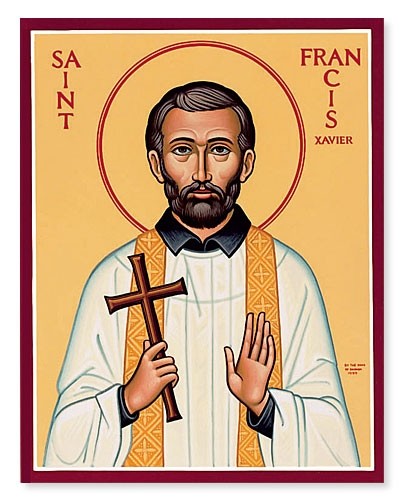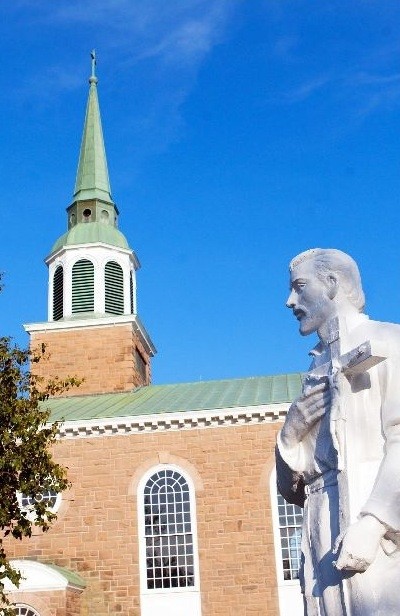St. Francis Xavier
St. Francis Xavier – His Life

What does it mean to be an apostle? The word comes from a Greek word meaning “to be sent.” Jesus called twelve men to be His apostles and sent them to bring the message of salvation to all. He called Paul of Tarsus to be his apostle to the Gentiles. Later – in the sixteenth century – Jesus called another man, Francis Xavier, to be an apostle to India and Japan.
Spain was the birth place of Francis Xavier, the youngest son of the chief counsellor of the kingdom. The private tutoring he received as a boy highlighted his great intelligence. Eventually he studied at the University of Paris, where he became a teacher of philosophy. He began a career that would bring him prestige and honour, and he accompanied it with an active social life.
Ignatius Loyola, who was a retired artillery captain, was a student at the same University. Ignatius recognized the many talents that Francis possessed. He saw the fiery ambition that made Francis a great athlete, as well as a good teacher. He saw Francis’ natural ability for leadership, his strong pride, and his extravagant generosity. For his part, Francis did not like Ignatius and mocked him for his life of sacrifice. Ignatius’ response often came in the form of a question: “What, then, will a man gain if he wins the whole world and ruins his life?” (Matthew 16:26).
Gradually Francis saw that all the energy, ambition, and talent he was using to further his own career could be better used to teach people about the love that god has for them. He struggled with himself for a long time, trying to choose between a life of popularity, prestige, and pleasure and a life of dedication, sacrifice, and love. Finally, with five others, he agreed to join Ignatius, who started the Society of Jesus (Jesuits). With the other men, Francis took the vows of poverty, chastity, and obedience.
These men wanted to serve the Church wherever there was a need. At this time, there was need for missionaries in the East Indies, and the Holy Father mentioned that a trading ship was leaving. Ignatius assigned two of his men to go. Before the ship sailed one of the men became ill and Francis Xavier was sent as a last minute replacement. On the five month journey across the ocean, Francis was constantly sea-sick. The food spoiled, and the precious clean water they had became contaminated with disease.
When Francis finally arrived in India, a new part of his life opened up – his life as a missionary. As he worked in this foreign land, he began to develop a system of evangelizing.
Francis would always start with the children first – not the influential, the busy, the intellectual. He would go down the street, ringing a bell and gathering the children so that he could tell them stories and teach them religious songs. Then he would go to the poor, the sick, the overworked, and the prisoners. He would become acquainted with them, life among them, and gain their confidence. By the example of his everyday life, Francis introduced them to the teaching and life of Jesus. Then, when he preached, they understood his message. Francis converted thousands in India before his zeal drove him to bring Christianity to Japan.
Francis Xavier faced many problems and physical hardships during his years as a missionary. The letters he wrote speak of his busy schedule and of his loneliness. He begged for news of his brethren. In addition, many of the Christians he worked with had been robbed, butchered or carried off as slaves by pagan leaders. The foreign merchants, with their greed and cruelty, also had caused problems for Francis. But Frances continued undaunted, his zeal for Christ moved him to consider China as the next place to take Christianity. China was a cultural centre, and Francis felt his life would be complete if he could also spread the Good News of Jesus to the people there.
However, God had other plans. Enroute to China, Francis developed a high fever and the sailors on the boat became frightened. They took him off and laid him on the sandy shore of a nearby island. The island was so close to the mainland of China that Francis could see it. But he was never able to get there. A fisherman found him as he lay dying, alone and abandoned, and took him to his hut. Francis died there on December 3, 1552.
His missionary spirit had been like that of the apostle Paul, who wrote: “It makes me happy to suffer for you, as I am suffering now, and in my ownbody to do what I can to make up all that has still to be undergone by Christ for the sake of his body, the Church” (Colossians I 24). Francis Xavier was canonized by the Church in 1622 and declared co-patron of the mission, with St. Therese of the Child of Jesus, in 1927.

Acknowledgements:
Prayers for the Xaverian Family. Antigonish, N.S: Chaplaincy Office of St. Francis Xavier University, 2003. Print.
Contact
306 Bloomfield Centre
5555 Union Place
Antigonish NS B2G 2W5
Canada

